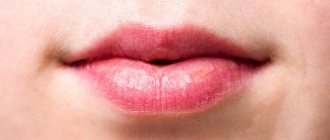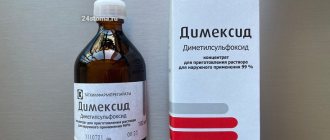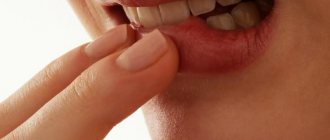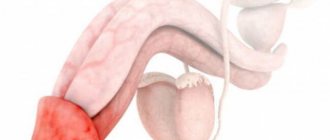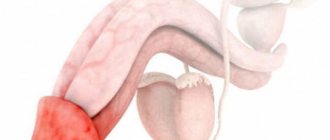WHAT WORRIES YOU? PAIN during intercourse HOW TO GET YOUR VIRGINITY BACK YOU DO NOT like the labia CYSTITIS after sex DARK perineum SIZE of the vagina INTIMATE life after childbirth LACK OF ORGASM WHAT IS YOUR INTEREST? Plastic surgery of the labia Restoration of virginity Surgical defloration Vaginal reduction Clitoral plastic surgery Intimate muscle training How to achieve orgasm HOW TO DO IT? Get intimate plastic surgery... Get contour plastic surgery... Intimate cosmetology... Take tests for a fee... See a gynecologist
In addition to being concerned about the appearance of their genitals, many women experience soreness or other problems related to the health of their labia. Inflammation, pain, swollen or irritated tissue and itching are common problems in this intimate area. Additional complaints include stretching after childbirth, pimples, increased thickness, and unusual or tender lumps on the inner surface of the labia minora.
The female reproductive system is divided into external and internal. When a process occurs in one organ, there is a risk of it occurring in the other. Infections often begin in the folds of skin of the external genitalia, primarily because they are moist due to their proximity to the urethra and vagina. For many women, the initial symptoms of genital diseases, especially itching, burning, swelling, discomfort, begin with minor irritation and can then progress and spread to the rest of the vulva and vagina.
Other symptoms that may occur with inflammation of the labia may include pain in the lower abdomen, burning when urinating, and increased vaginal discharge. They are usually thick, yellow, green, and have a persistent unusual odor. The most common causes of vulvar and vaginal discomfort are thrush and bacterial vaginosis, and these can be successfully treated with medication. Sexually transmitted diseases are a concern both in terms of correct diagnosis and rational, effective treatment.
Inflammation of the labia minora and majora can often be accompanied by the formation of erosions and ulcers on their surface. As a result of scratching, the ulcers can merge and form confluent erosive surfaces that are prone to bleeding. Ulcers are most often the result of the spread of a virus or infection that leads to inflammation. Itching of the external genitalia in women is present in almost any type of infectious process. Inflammation of the labia is almost always accompanied by itching, which aggravates the severity of the process. The fact is that constant trauma when scratching an intimate area contributes to the spread of the inflammatory infiltrate and an increase in the number of ulcers. The addition of secondary microbial flora is also possible.
But inflammation of the genital organs is not always a consequence of infection. It may be a manifestation of an allergic reaction to the substance. Most often these are remnants of washing powder, lubricant on a condom or intimate hygiene gel. Sometimes inflammation can be a response to lack of hygiene in partners. This fact must also be taken into account during intimacy.
Inflammation of the labia may be a consequence of recent hypothermia (for example, after a swimming pool or simply in cold weather). As a result, dense formations the size of a pea are palpated in the area of the external genitalia - this is an inflamed lymph node.
Why do the labia become swollen after sex?
Some girls are frightened by the situation when, after sex, the labia is swollen - one or two at once. In fact, nothing terrible happened, because they are equipped with a large number of venous and arterial vessels and nerve endings. Since one of the erogenous zones of the female body is located in this place, any caress or simple touch causes swelling of the lips of the genital area. The quantitative increase in their size depends on the individual characteristics of the body and the level of hormonal levels. By the way, according to the observations of gynecologists and reviews from the patients themselves, rubbing, itching and swelling occur in girls and women who have enlarged, stretched labia of complex shape.
If the change in the size of the labia, their swelling and the desire to scratch them lightly are associated only with intimate contact, then there is no need to worry. But if swelling does not go away after 8-10 hours after sexual intercourse, you should think about visiting a gynecologist, as the cause may be a disease.
If any discomfort occurs in the intimate area, including when the labia minora are swollen, it is worth determining the cause and a good gynecologist will help with this. Reception of a specialist in our clinic daily, from 10-00; pre-registration by phone 8(495)761-1085 or online on the website.
Symptoms of inflammation of the labia
The inflammatory process in the area of a woman’s external genitalia (vulva) is referred to in gynecology as “vulvitis.” This condition has characteristic symptoms, such as redness, itching, swelling of the labia, painful symptoms when urinating, and copious natural female discharge. A woman may also experience a number of additional symptoms:
- the appearance of roughness of the labia minora, which is nodules of enlarged sebaceous glands;
- the appearance of a whitish coating, plaques reminiscent of psoriasis rashes;
- feeling of general malaise and fever.
Like any other inflammatory process, vaginitis is divided into acute and chronic. The acute form is characterized by pronounced symptoms, while the chronic process is more sluggish and unnoticeable.
Expert opinion
You should be especially careful about the development of vulvitis in little girls, since children tend to hush up problems associated with discomfort in the intimate area. For this reason, it is necessary to make it clear to the child that if he experiences any unpleasant sensations, he must inform his elders about their occurrence.
Obstetrician-gynecologist of the highest category Oksana Anatolyevna Gartleb
Gynecologist appointment
Consequences and complications
If the disease is not treated promptly, it can become chronic. Complications may be as follows:
- ulcers on the genitals;
- vulvovaginitis;
- cervicitis, endometritis ;
- candidiasis;
- urethritis , cystitis ;
- formation of scarring, condylomas .
If the disease is not treated and, accordingly, complications develop, a kind of “vicious circle” can be observed when complications, in turn, will provoke the re-development of vulvitis .
Causes of vulvitis
In order to clearly understand the causes of vulvitis, it is worth dividing this disease into 2 types: primary and secondary. Primary vulvitis develops in the case of:
- Failure to comply with the rules of intimate hygiene (irregular washing, rarely changing tampons and pads during menstruation, rarely changing underwear, wearing tight and synthetic underwear).
- Sudden hypothermia or overheating of the body.
- Mechanical damage to the vulvar mucosa during sexual intercourse, constant use of tight clothing made of coarse fabrics, removal of hair, and combing.
- Chemical exposure to various drugs.
- Hormonal imbalance and metabolic disorders (obesity, diabetes, insufficient ovarian function, lack of vitamins and minerals in the body);
- Allergic reactions.
Secondary vulvitis, vulvovaginitis (Vulvovaginitis) occurs due to infection of the external genitalia by pathogenic microorganisms contained in vaginal discharge.
Vulvitis - causes
Irritation of the labia can be caused by thrush, colpitis (Vaginitis), endometritis (Endometritis) and other diseases of various organs, not necessarily directly related to the mucous membranes and skin of the genitals. It is worth noting that long-term or frequent use of antibiotics can cause disruption of the vaginal microflora and subsequent vulvitis.
Inflammation of the labia - vulvitis
As medical statistics show, secondary vulvitis most often occurs in women of reproductive age, while primary inflammation is more often diagnosed in childhood. This is facilitated by the tendency of children to diathesis, helminthiasis (Helminthosis) (pinworms with improper hygiene can get into the labia area, causing an inflammatory process).
In this case, vulvitis in girls can be complicated by the appearance of synechiae, which are adhesions connecting the labia minora.
Vulvitis can occur during pregnancy, especially if a woman does not follow the rules of intimate hygiene or wears inappropriate underwear. Vulvitis can occur after childbirth. As the fetus passes, the vagina and labia are injured, which can cause subsequent inflammation.
Types of surgery
Based on the characteristics of the tumor, its treatment is prescribed. Surgical interventions to eliminate this disease:
- Cryodisruption. Nitrogen exposure is carried out. Freezing tissue stops cell development. During the operation, low-temperature liquid nitrogen is applied to the condyloma. The operation is performed without anesthetic. Not painful. The operation was well tolerated. Removing tumors with liquid nitrogen is a special technology; not every clinic performs these manipulations. The operation has minimal complications. There may be a small scar or burn.
- Radio wave excision. A directed flow of low frequencies dissects the tumor. Radio wave is the most gentle method in relation to neighboring tissues. There is no pain. There is no risk of scarring, bleeding, suppuration, or necrosis. Healing occurs in the shortest possible time.
- Laser. A directed laser evaporates the tufted growths. Laser ablation is used to excise resistant condylomas. The skin is not injured, and under the influence of the laser, epithelial cells grow. The depth of laser exposure is controlled. Does not leave scars. No contact with tissue occurs.
- Electrical coagulation. Electric current is used to cauterize the damaged area. The removed material is sent for histological analysis. The process has a number of contraindications. For example, herpes, oncology, hemostasis, inflammation of neoplasms. There are cases of relapse. There may be a small scar on the surface of the vulva.
- Chemical exposure. The destruction method involves applying a special drug to the affected area. A special composition with organic and inorganic acids, nitrates causes burning and death of condyloma cells. It is not accompanied by pain and is used without anesthesia.
- Plasma coagulation. An arc discharge containing gas penetrates the tissue and vaporizes areas with growths. Cauterizes blood vessels. The method has a high level of efficiency. Thermal damage to tissue occurs at a minimum depth, which promotes rapid healing. No scars are formed and pain is minimal.
Diagnosis of vulvitis
To diagnose vulvitis, in most cases, a simple manual examination by a doctor is sufficient, as well as taking a smear for bacteriological, bacterioscopic and cytological examination. The results obtained allow us not only to determine the presence of inflammation, but also to exclude malignant tumors and identify the causative agent of the infection. Additionally, the doctor may prescribe a stool test to detect helminthiasis.
Appointment with a doctor for the treatment of vulvitis
A detailed description of the symptoms and the initial stage of the disease will also have diagnostic value for the doctor. This will simplify the diagnosis and make it possible to exclude any concomitant infections. After all, the itching that vulvitis causes leads (especially often in girls) to the appearance of scratching in the area of the external genitalia, which may also indicate the presence of diseases such as pediculosis, dermatitis or lichen. Also, the cause of itching in the labia area can be any sexually transmitted disease, which sometimes may require consultation with a dermatovenerologist or additional diagnostics.
Diagnostic procedures
The vulva is examined during a pelvic examination. A gynecologist performs vaginal examinations. A transvaginal ultrasound is prescribed. If necessary, vulvoscopy and colposcopy. A bacterial smear is examined to exclude infectious diseases. Clarification of the nature of the neoplasm using histological examination. For biological analysis, scrapings and punctures of tumors are taken.
Removing the tumor often causes a new growth to appear. Removing papillomas requires long-term treatment. Surgeries and the postoperative period may occur with complications. Hematomas may form, the urinary system may be disrupted, and severe bleeding may occur.
Treatment of vulvitis
If you notice any alarming symptoms, you should immediately consult a doctor. Only a specialist can diagnose the cause and prescribe correct and quick treatment, including a set of measures: relieving inflammation, eliminating factors that are catalysts for the process.
The basis of treatment for vulvitis is the elimination of the causes of the inflammatory process and treatment of concomitant diseases, which may include diabetes mellitus (Diabetes mellītus), gonorrhea (Gonorrhoea), diphtheria (Diphtheria), helminthiasis. After receiving smear test data and checking the sensitivity of the infectious agent, the doctor can prescribe medication, most often antibacterial drugs. Vulvitis responds well to treatment with local remedies, which include all kinds of ointments, gels and suppositories.
In parallel, in the course of treatment of vaginitis, vitamin complexes can be prescribed, including vitamin A to effectively protect the epithelial layer, as well as vitamins E and C, known for their antioxidant properties.
To combat severe symptoms, other drugs may be prescribed:
- Antihistamines that help relieve itching.
- Hormonal, occurring in atrophic vulvitis in the postmenopausal period.
- Anesthetics that relieve pain.
In addition to the medications prescribed by your doctor, you can use Gynocomfort Restoring Gel. This product was created by specialists from the pharmaceutical company VERTEX and underwent clinical trials at the Department of Dermatovenerology with the clinic of the St. Petersburg State Medical University. During testing of the gel, it was proven that it is a very effective additional agent as part of the complex therapy of inflammatory processes of the female genital tract.
As additional therapeutic measures that can be used at home, it is worth mentioning warm baths with herbal infusion.
Chamomile, calendula, string, and comfrey have excellent anti-inflammatory properties.
Baths will help not only reduce inflammation, but also relieve symptoms such as itching, burning and pain.
During pregnancy
Vulvitis can occur at any stage of pregnancy, since during this period a woman is more susceptible to infections and exacerbation of chronic diseases. In addition, during the period of bearing a child, the immune defense weakens, which also contributes to the proliferation of pathogens.
Treatment of vulvitis in a pregnant woman should be carried out under the supervision of a doctor after all the necessary tests have been carried out. The doctor prescribes safe medications, mainly for topical use. It is also important to take measures to boost your immunity . Antibacterial and antifungal agents are prescribed only when absolutely necessary.
The expectant mother should understand that if vulvitis remains untreated during pregnancy, this risks infecting the child during childbirth.
Prevention of inflammation of the labia
To prevent vulvitis, it is necessary, first of all, to maintain intimate hygiene. It is recommended to use products designed specifically for caring for intimate areas. Ginocomfort washing gels for intimate hygiene, which were developed by specialists of the pharmaceutical company VERTEX, taking into account the characteristics of the microflora of the genital organs, are well suited for this purpose. They do not dry out the mucous membrane and do not disturb the acid-base balance. These products have a package of necessary documents and quality certificates.
Other measures to prevent inflammatory processes in the labia area include the following:
- Proper drying of the genitals after hygiene procedures. It should be carried out with a clean towel or napkin in the direction from front to back or with gentle blotting movements.
- Careful selection of underwear. It is optimal if it is underwear made of natural and soft material that will not squeeze or rub the perineum.
- General maintenance of immunity, which will allow the body to independently fight infection and suppress the proliferation of pathogens.
Inflammation of the labia in women, video
Gynecologist Irina Vladimirovna Garyaeva about vulvitis in women.
Source - KVD - dermatovenerological dispensary Sources:
- ROLE OF INFECTIONS IN THE GENESIS OF VULVA DISEASES. Reutskaya M.A., Kulinich S.I. // Siberian Medical Journal (Irkutsk). – 2010. – No. 6. – pp. 239-242.
- CLINICAL AND MORPHOLOGICAL PRINCIPLES OF TREATMENT OF CHRONIC VULVITIS. Kulinich S.I., Reutskaya M.A., Pokinchereda T.V., Ezhova I.V. // Acta Biomedica Scientifica. – 2013. – No. 5 (93). – P.42-48.
- Diseases of the cervix, vagina and vulva: Clinical lectures. Ed. V.N. Prilepskaya. // M.: MEDpress. - 1999. - P. 432.
- Recurrent vulvovaginal candidiasis: etiology, pathogenesis, treatment. Levonchuk E.A. // Med. news. - 2001. - No. 4. — P. 40-43.
- Dystrophic diseases of the vulva. Diseases of the cervix, vagina and vulva. Ed. V.N. Prilepskaya. // M.: MEDpress. - 1999. - pp. 326-336.
- https://simptom-lechenie.ru/en/vulvit-u-zhenshhin-i-devochek-simptomy-i-lechenie.html
- https://www.thenakedscientists.com/science-articles
- https://woman-centre.com/vlagalische-i-vulva/vulvit/vulvit-u-zhenshhin.html
- https://simptomer.ru/bolezni/zhenskie-zabolevaniya/864-vulvit-simptomy
Diet
Diet for candidiasis
- Efficacy: therapeutic effect after 10 days
- Terms: 3 months or more
- Cost of products: 1400-1500 rubles per week
Hypoallergenic diet
- Efficacy: therapeutic effect after 21-40 days
- Timing: constantly
- Cost of products: 1300-1400 rubles. in Week
If you have vulvitis, your diet should include the following foods:
- Fermented milk products - fermented baked milk, kefir, milk, sour cream, whey, natural yogurt.
- To compensate for the deficiency of vitamins E and A - broccoli, viburnum, spinach, seaweed, dried apricots, prunes.
- To replenish the lack of vitamin C - currants, strawberries, wild strawberries, sea buckthorn, apples.
- Sources of vitamin B are nuts, legumes, liver, mushrooms, cheese.
- Sources of zinc are buckwheat, peas, nuts, turkey, beef.
- Sources of calcium are dairy products, barley porridge.
- The diet for vulvitis should not include fatty, sweet, spicy, salty foods.
The following should be excluded from the menu:
- Smoked meats.
- Pickles.
- Alcohol.
- Ketchups, mayonnaise.
- Canned food.
- Yeast baked goods.
For allergic vulvitis, a hypoallergenic diet is prescribed, which excludes all foods that cause allergic reactions.
Popular questions
I suspect inflammation and cysts.
The doctor prescribed IV thiosulfate, IM ceftriaxone, and Diclovit suppositories. I just didn’t explain, is it necessary to apply everything at the same time or what? Hello! Most often, this complex of treatment is carried out simultaneously, but it is better to check with your doctor.
Hello. My labia and clitoris are swollen, there is a burning sensation and a cheesy discharge with something in it, the color is unclear. What could it be and how to treat it? Before that I had inflammation and treatment, and after that it all started. Hello! This is how vulvovaginitis manifests itself. I recommend that you contact an obstetrician-gynecologist and conduct an examination to find out the cause of the inflammation. This will allow you to correctly prescribe therapy. At this stage, you can use Gynocomfort gel with tea tree oil, 1 dose once a day, which will limit the spread of inflammation and improve your well-being.
Hello! Severe itching on the labia, irritation. There is nothing to worry about in the vagina itself. What could it be?
Hello! This may result in an allergic reaction or inflammation. I recommend using Ginocomfort gel with mallow extract, applying it once a day to the discomfort zone for 7 days. If you do not notice relief, consult a doctor.
Good morning, I have vulvitis on my labia minora, I don’t know what to do or how to treat it.
Hello!
If inflammation occurs in the labia minora area, you can use Gynocomfort gel with tea tree oil. The gel is applied in a thin layer once a day for 1 week. If complaints persist, you should consult a specialist. For an accurate diagnosis, contact a specialist
Expert opinion
Often women hesitate to visit a doctor and try to cope with vulvitis on their own. They find folk remedies on the Internet or learn from friends, buy and take medications on their own. You can suppress the symptoms, but you cannot completely cure the inflammation. An integrated approach is needed.
Moreover, taking pills for vulvitis without a doctor’s prescription can complicate the course of the disease. Pathogenic microflora becomes resistant to drugs. It is extremely difficult to treat such patients in the future. If to this is added a burn to the mucous membrane, an allergy, or other “surprises” from folk remedies, then a whole consultation has to be involved in drawing up a treatment regimen.
There is no need to be embarrassed by the symptoms and waste time. The doctor will help you get rid of the disease in just a few days if you start treatment at an early stage.
